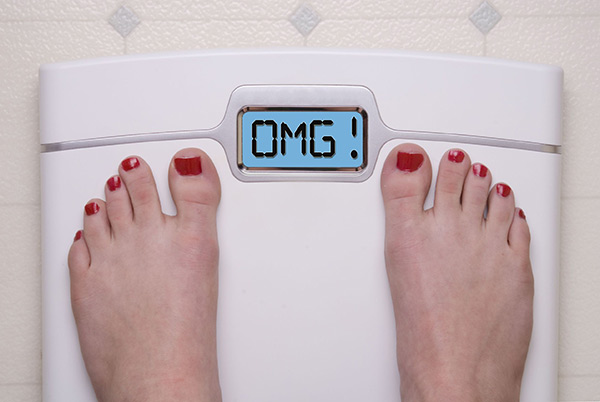
Is Gluten Making You Fat?
It’s a bright new year and perhaps you started yours with some resolutions. For many Americans, at the top of the list is losing weight. January is a busy month at gyms and weight loss clubs. But alas, by February the “glow” has worn off and attendance wanes.
But just because resolutions don’t frequently result in success doesn’t mean that yours need to fail. In this article, Dr. Vikki weighs in and gives you everything you need to enjoy 2013 with invigorated health and a slimmer waistline.
Are you overweight? Do you wonder if gluten is the culprit? Have you started a gluten-free diet and failed to lose weight?
If you answered “yes” to any of these questions, then read on!
Two thirds of Americans are overweight, over one third are obese, and frighteningly, those numbers are increasing steadily with the United States being the fattest country in the world. Is gluten a culprit in this obesity epidemic? While I don’t think we can give it full responsibility, it definitely plays a leading role.
Gluten, found in wheat, rye, barley, and some related grains such as couscous, spelt, farro, and kamut, is a protein that humans don’t digest properly. Notice I said “humans,” not humans with celiac disease or gluten sensitivity. It’s a well known fact that the human digestive tract is incapable of fully digesting the gluten protein. It begs the question if it really should be considered a food when we cannot fully digest it.
For those with gluten intolerance,gluten is viewed by the body as a toxin,not a food. Whether that toxicity is affecting your digestive tract, your brain, your joints, your liver, your hormones, or any other system in your body, it is well understood that bodies with a high toxic load are often overweight. Why? The body simply slows down the burning of calories so that it can instead store that energy to “deal” with the high toxic load. There was an interesting study that took two groups of rats and put them both on a high fat diet. One of the groups was given a modest amount of a pesticide. It wasn’t enough to kill them, but it was enough to cause toxicity. Despite the exact same diet and calorie consumption, only the “toxic” rats gained weight, not the others.
This same premise has been seen in humans as well and it’s certainly something I’ve documented with my patients over the years. Those who were having trouble losing weight often had a toxic burden that was preventing their body from burning calories. Once the toxin (often gluten) was identified and removed, the weight fell off.
Are we clear that gluten is a toxin? Absolutely. And now we understand that toxins cause us to gain weight.
But there’s another mechanism whereby gluten can cause weight gain and that has to do with cravings. As anyone who suffers from them knows, cravings are difficult to ignore. Gluten reactions can cause your brain to make a substance called gluteomorphins. This substance is much like morphine in that it gives your body a “high.” Have you ever felt addicted to gluten or dairy products? It’s because you were, chemically speaking. (By the way, dairy reactions can result in the production of caseomorphins, a very similar substance that acts in the same addictive way.)
When you eat gluten and your body makes gluteomorphins, you feel good and happy and satisfied. But after some time passes and the level of gluteomorphins wanes, your body lets you know that it needs a “fix,” leading to strong gluten cravings. This is not all in your head and your craving is not because you are “weak of will.” It’s factually a chemical, addictive reaction that makes staying away from gluten no easy task. So, of course, if you give into that craving you will not only be filling your body with more toxins that can lead to weight gain, but you’ll be compounding the problem by eating, in excess, a high calorie, nutrient poor food – another cause of weight gain.
Now let me make something perfectly clear. You must not use the addictive nature of gluten as an excuse as to why you cannot stick to your diet. Anyone can get over this addiction because the good news is that the chemical reaction ceases after three days. You can do anything for three days, right? Trust me, you can. If you need help, let me know.
So we now know two ways that gluten can cause weight gain.
A third reason, gluteomorphin production aside, is that the irritation and inflammation that gluten creates often results in poor absorption of nutrients. Intuitively you may think that if you were absorbing nutrition poorly you would be underweight. It does make sense, but it’s not what we tend to see here in the US where there is plenty of food at our disposal. Because the cells aren’t being adequately fed, the body sets up a craving for foods that will quickly raise the blood sugar level. That blood sugar, or fuel level, is low because the food that you’ve been eating is not turning into good fuel. Unfortunately for your waistline, the foods that will raise blood sugar levels quickly happen to be sugary, overly refined, and nutrient poor. The result? An unhealthy, nutrient deprived, yet overweight body.
What’s the Solution?
- First and foremost you need to find out if gluten intolerance is a problem for you by using one of the following ways:
- Get a blood test for celiac disease – tTG is a common one. Both the IgG and IgA version should be done.
- Get a blood test for gluten sensitivity – AGA is good and you can get both tests done at the same time. Also get both IgG and IgA of this test. The AGA can be seen positive in celiac disease as well but the tTG test is exclusive for celiac (it won’t be positive in the gluten sensitivity).
- Get a genetic test. If you are currently not eating gluten I would never recommend you reintroduce it to perform one of the above tests. Genetic test don’t require you to eat gluten in order to be accurate. Reintroducing gluten could be dangerous, resulting in a very severe reaction or even an initiation of an autoimmune disease. There is an online genetic test through EnteroLab that evaluates both celiac and gluten sensitive genes.
- In addition to the tests, I also recommend a strict 30 day gluten elimination diet to see how you feel. The tests listed in points (a) and (b) are not perfect. They are not as sensitive as they need to be and this results on many false negatives. An elimination diet will not lie. As long as you avoid all gluten, your body will tell you if it feels better after 30 days – and sometimes quite a bit sooner.
- Once you have determined that you are gluten intolerant, you need to be vigilant in removing it entirely from your diet. There is no room for error or occasional cheating when it comes to gluten. It’s a “zero tolerance” policy and any gluten, no matter how small an amount, will have negative repercussions.
- If you’re someone who craves gluten strongly, prepare yourself for the three days of cravings that will ensue. Have a friend or family member around to watch and distract you. Make sure there are no temptations lying around the house and instead make sure that you have plenty of good, healthy, gluten-free food to eat.
- When it comes to a healthy diet there is much more to discuss than simply avoiding gluten. I know that it’s not simple, believe me I do, but gluten avoidance is just the first step in healthy eating.
Here are some do’s and dont’s:
DO find gluten-free alternatives to some of your favorite gluten-containing foods such as bread, cereal, etc.
DON’T make gluten-free “goodies” a staple in your diet. White bread made of rice and tapioca id no less refined and no less of an over-processed, nutrient poor food that white bread. Don’t get me wrong, I’m a big fan of my gluten-free bread and cookie mix, but I just don’t partake often and I recommend the same for you.
DO figure out how to eat nine servings of organic fruits and vegetables each day. The wonderful antioxidants and phytonutrients (phyto means plant) that these amazing foods provide are healing, nourishing, and anti-inflammatory – something that helps every American become healthier and slimmer, gluten intolerant or not. Remember, some of the best foods to eat are those that don’t have an ingredient list (like kale, broccoli, blueberries, etc.).
DON’T drink your fruits in the form of juice or eat dried fruit. Both have lost much of their nutrient value. The one exception to “drinking” your fruits and vegetables is if you are liquefying them in a blender and making your own green smoothie. That, in fact, is one of the very best ways to ingest these nutritional powerhouses. Note that this is a liquefying process, not a juicing process that in turn removes all the pulp.
DO eat adequate amounts of good fat including olive oil, coconut oil, fish oil (it’s ok to get this in supplement form), fresh nuts and seeds, and avocados. Good oils, especially the omega-3 fatty acids found in fish oil, are anti-inflammatory and therefore helpful in preventing degenerative disease and healing the damage caused by gluten.
DON’T eat rancid nuts or seeds, or fish that has a high mercury content. Yes, you can be getting some good oils from fish, but if that oil comes with the neurotoxin mercury, you’ve done yourself no benefit and quite a bit of harm.
DO consume adequate amounts of protein. It turns out that we need quite a bit less protein than we used to think. A moderate amount can be sourced from a plant-based diet. Of course, you can also consume animal flesh as a source of your protein.
DON’T consume animal products that have been fed hormones, antibiotics, pesticides, or a high grain diet. Eating these animals will create a burden on your body due to the poor diet and drugs/chemicals they have been fed.
DO drink adequate amounts of water. It is amazing how many people are actually dehydrated, which prevents the body from getting rid of toxins – and now you know how important that is!
Follow this formula to ensure adequate water intake: divide your weight (in pounds) in half. That number equals the amount of water you should drink per day in ounces. About eight ounces (one cup) per hour is a good amount to strive for. And don’t worry about the extra bathroom visits – this is a clue that you are actually hydrated. (Another tip: your urine will be almost clear.)
5. Lastly, find a clinician who can properly address any toxicity issues or hormonal imbalances that are present as a result of being gluten intolerant. The secondary effects of gluten are many but they are not difficult to treat. You do need to find a doctor who is well versed in treating these various effects that can include infections, cross-reactive foods, probiotic imbalance, other food sensitivities, hormonal imbalance, and elevated toxic metal levels. A body that is burdened with any one of these will not lose weight, let alone be healthy.
I realize that finding such a clinician is not an easy task. My clinic personally assists individuals from all over the world. Whether it’s finding them a local doctor (unfortunately there are not nearly enough of these) or facilitating a visit to our destination clinic, we are here to assist you in improving your health and losing weight.
Finally, there may be some of you with celiac disease dealing with the opposite problem of this article’s theme: you have trouble gaining weight due to the vast amount of damage that gluten caused to your small intestine. This likely resulted in extreme malnutrition. You need to heal that small intestine while maintaining your gluten-free diet so that your body can begin absorbing good nutrition. While your problem is very different from what we’ve been discussing, points #2, #4, and #5 are pertinent for you as well.
Overweight is a problem that we all must confront in this country. Our excess pounds set us up for degenerative diseases such as heart disease, cancer, diabetes, and autoimmune disease. Gluten, if you are intolerant to it, is not the friend of your waistline or any other part of your body.
Please let me know how you do with these tips. You can always contact me for a free health analysis. We treat patients from across the country and internationally at our destination clinic, so you don’t need to live locally to receive help. Call us at 408-733-0400.
To your good health,
Dr Vikki Petersen, DC, CCN




Pingback: Gluten Free Roasted Vegetable Spread & Flax Meal Crackers Recipe | Simply Gluten Free